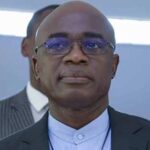Amanda Asagba is a human rights lawyer and president of the African Women Lawyers Association (AWLA). In this interview, she speaks about how the association is handling issues around the #EndSARS crisis of October, 2020, and the need for stronger laws to protect the rights of Nigerian widows. Excerpts:
Following the recent evidence of your witness before the Corona Court that over 150 inmates were killed at the Ikoyi Correction Centre after the Lagos #End SARS protest in 2020, the Nigeria Correctional Service claims only 20 inmates were killed. What is your reaction?
The witness said more than 150 inmates were killed. I am surprised that the authorities are claiming 20 inmates were killed. Initially, they said no inmate died. Later, they said only one inmate died, and now they say only 20 inmates were killed. Maybe later they will tell us it was 100 that died! The inconsistencies are just too enormous.
Need for a supplementary national honours’ list
Union Bank, MobiHealth Int’l announce partnership on telemedicine
The witness told the court what he saw and that he also participated in evacuating the corpses from the scene where they were shot down to the correctional centre hospital. So, what else can we say? Whom should we believe? Someone said nobody died and later said that one person died, and now says only 20 inmates died.
In between then and now, what have they done with the 20? Have they informed the families of the deceased? Have they done the DNA? Why did they not tell us the number of people who died before now?
How did you come across this information because it has been shrouded in secrecy?
We have some clients in custody for a criminal case; about five defendants were standing joint trial for a crime. Of the five accused persons, the mother of one of them called to say that someone told her that her son was shot dead in prison during the lockdown and she wanted to know if it was true.
As lawyers, a few days later, we went to the Ikoyi Correction Centre to ask questions. But we could not get any information. Later, someone called and told us that our client was one of the inmates who had been shot dead. Further visits revealed other information that we cannot disclose.
The mother wanted to get the corpse and do a proper burial, but the authorities asked her to come and sign an indemnity that she would not sue the prisons. But our clients refused to sign. Based on that, we wrote to the Corona Court to investigate the killings at the prison. That was when the Corona Court was set up by the Lagos State Government, which has asked all those whose relatives are missing to come forward.
While we were at it, some colleagues also called to say that their clients were affected. So, the witness evidence cannot be wished away. Further evidence will reveal more.
Are people who need free legal services getting them?
That is another level of injustice in this country. These ex-inmates do not even have money to transport themselves to the Coroners’ Court. We have been providing them with money. Granted, we have the Legal Aid Council and the National Human Rights Commission, but these government agencies cannot take care of the number of poor people that need their services compared to the crime rate in the country.
I don’t see how the government can be able to take care of all these cases, and that is where the NGOs come in. But we don’t even get funding as an NGO. The donors will rather deal with the government than the NGOs. Raphel’s mother is a woman, and that is our core area. So, whenever a woman is involved AWLA steps in.
What is the plight of widows in society and what can be done to ameliorate this situation?
There is a need for urgent action to protect widows against various forms of violence, including harmful widowhood practices. A majority of widows are subjected to torture, and inhuman and degrading treatment after the loss of their spouses, which consequently, makes it imperative for favourable policies to be implemented to safeguard their rights.
For many women around the world, it is a devastating loss and that loss is magnified by a long-term struggle for basic needs, as well as their human rights and dignity.
They may be denied inheritance rights to the piece of land that they relied on for livelihood or evicted from their homes, forced into unwanted marriages or traumatizing widowhood rituals, and subjected to other harmful cultural practices.
They are stigmatised for life, shunned, shamed, and isolated and many of these abuses go unnoticed, even normalised.
Are there no policies to protect widows?
Policies focus on common citizens, labourers, jobless youths, and other suffering segments of society. However, nothing is specifically discussed about widows at policy-making meetings. Such an ignoring attitude means that the issues of more than 258 million widows worldwide remain unaddressed.
In many Nigerian cultures, widows are often accused of killing their spouses, “until they proved their innocence through some forms of traditional rituals like sleeping in a room with their husband’s corpse, drinking the bath water of their husband’s corpse, and many other demeaning practices.
These widowhood practises are acts of trauma that have a negative impact on her children, because when a widow is denied her inheritance rights, the children become homeless.
Are there no laws to protect widows?
There exists the legal framework to protect widows, such as the Nigerian Constitution, the Violence Against Persons Prohibition (VAPP) Act, and the Convention on the Elimination of all forms of Discrimination Against Women (CEDAW), described as an international bill of rights for women.
There is also the Protocol to the African Charter on Human and Peoples’ Rights on the Rights of Women in Africa, popularly known as the Maputo Protocol, as well as the Child’s Rights Act, which protects women and children. While all these laudable legislations exist, there is the problem of enforcement.
What is AWLA doing about this?
Yes, we have the laws but how accessible are the widows to justice? We at AWLA lend our voices to say, “Stop the violence against widows, don’t abuse widows, don’t stigmatise widows, don’t oppress widows, widows are not witches, widowhood is not a curse.”
We advocate for subsidised accommodation, school fees, legal aid and welfare packages for widows and their children. We advocate for the establishment of a specialised agency for widows – to follow up on them and ensure they’re protected and given access to benefits available for them and their children.
AWLA is properly poised to render free legal services to widows and would go the extra mile to stop indignity to women and children.

 Join Daily Trust WhatsApp Community For Quick Access To News and Happenings Around You.
Join Daily Trust WhatsApp Community For Quick Access To News and Happenings Around You.


